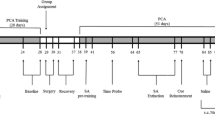Abstract
Rationale
Animal studies have demonstrated decreased reward responsivity during nicotine withdrawal (e.g., Epping-Jordan et al., Nature 393:76–79, 1998) and the Card Arranging Reward Responsivity Objective Test (CARROT) has recently been used to study the effect of nicotine withdrawal on reward responsivity in humans (e.g., Al-Adawi and Powell, Addiction 92:1773–1782, 1997; Powell et al., Biol Psychiatry 51:151–163, 2002). We investigated a suggestion that nicotine withdrawal may have additional reward-related effects apart from the reward responsivity effects already observed.
Objective
The objective of this study was to determine whether or not nicotine withdrawal results in slower improvements in performance on a card-sorting task over a series of trials.
Method
We carried out two experiments using a modified version of the CARROT, the mCARROT, to compare the performance of human participants in nicotine withdrawal with those who were satiated.
Results
Although withdrawal produced no direct effect on the mCARROT measure of reward responsivity, the overall sorting rate was lower, and the increase in sorting rate across successive trials was slower during nicotine withdrawal than during satiation.
Conclusions
These data indicate that nicotine withdrawal impacted on task performance independently of the introduction of a performance contingent reward, suggesting a novel reward-related effect of nicotine withdrawal.




Similar content being viewed by others
References
Al-Adawi S, Powell J (1997) The influence of smoking on reward responsiveness and cognitive functions: a natural experiment. Addiction 92:1773–1782
Barr RS, Pizzagalli DA, Culhane MA, Goff DC, Evins AE (2008) A single dose of nicotine enhances reward responsiveness in nonsmokers: implications for development of dependence. Biol Psychiatry 63:1061–1065
Cools R, Blackwell A, Clark L, Menzies L, Cox S, Robbins TW (2005) Tryptophan depletion disrupts the motivational guidance of goal-directed behavior as a function of trait impulsivity. Neuropsychopharmacology 30:1362–1373
Dawkins L, Powell JH, West R, Powell J, Pickering A (2006) A double-blind placebo controlled experimental study of nicotine: I—effects on incentive motivation. Psychopharmacology 189:355–367
Eissenberg T (2004) Measuring the emergence of tobacco dependence: the contribution of negative reinforcement models. Addiction 99:5–29
Eissenberg T, Balster RL (2000) Initial tobacco use episodes in children and adolescents: current knowledge, future directions. Drug Alcohol Depend 59:S41–S60
Epping-Jordan MP, Watkins SS, Koob GF, Markou A (1998) Dramatic decreases in brain reward function during nicotine withdrawal. Nature 393:76–79
Fagerström KO, Schneider NG (1989) Measuring nicotine dependence: a review of the Fagerstrom tolerance questionnaire. J Behav Med 12:159–182
Glautier S (2004) Measures and models of nicotine dependence: positive reinforcement. Addiction 99:30–50
Glautier S, Bankart J, Rigney U, Willner P (1998) Multiple variable interval schedule behaviour in humans: effects of ethanol, mood, and reinforcer size on responding maintained by monetary reinforcement. Behav Pharmacol 9:619–630
Greenhouse SW, Geisser S (1959) On methods in the analysis of profile data. Psychometrika 24:95–112
Heatherton TF, Kozlowski TL, Frecker CR, Fagerström KO (1991) The Fagerström test for nicotine dependence: a revision of the Fagerström tolerance questionnaire. Addiction 86:1119–1127
Herrnstein RJ (1979) Derivatives of matching. Psychol Rev 86:486–495
Hughes JR (1992) Tobacco withdrawal in self-quitters. J Consult Clin Psychol 60:689–697
Hughes JR (2007) Effects of abstinence from tobacco: etiology, animal models, epidemiology, and significance: a subjective review. Nicotine Tob Res 9:329–339
Jarvis MJ, Sutton SR, Waters AJ (1998) Nicotine withdrawal and accident rates. Nature 394:137
Koelega HS (1992) Stimulant drugs and vigilance performance: a review. Psychopharmacology 111:1432–2072
Koob GF, Le Moal M (2005) Plasticity of reward neurocircuitry and the ‘dark side’ of drug addiction. Nat Neurosci 8:1442–1444
Pomerleau CS, Marks JL, Pomerleau OF (2000) Who gets whats symptom? Effects of psychiatric cofactors and nicotine dependence on patterns of smoking withdrawal symptomatology. Nicotine Tob Res 2:275–280
Powell JH, Al-Adawi S, Morgan J, Greenwood RJ (1996) Motivational deficits after brain injury: effects of bromocriptine in 11 patients. J Neurol Neurosurg Psychiatry 60:416–421
Powell J, Dawkins L, Davis RE (2002) Smoking, reward responsiveness, and response inhibition: tests of an incentive motivational model. Biol Psychiatry 51:151–163
Rios-Bedoya CF, Snedecor SM, Pomerleau CS, Pomerleau OF (2008) Association of withdrawal features with nicotine dependence as measured by the Fagerstrom Test for Nicotine Dependence (FTND). Addict Behav 33:1086–1089
Stolerman IP, Jarvis MJ (1995) The scientific case that nicotine is addictive. Psychopharmacology 117:2–10
Acknowledgement
We are grateful to Jane Powell for her helpful comments on an earlier version of this manuscript.
Author information
Authors and Affiliations
Corresponding author
Rights and permissions
About this article
Cite this article
Kalamboka, N., Remington, B. & Glautier, S. Nicotine withdrawal and reward responsivity in a card-sorting task. Psychopharmacology 204, 155–163 (2009). https://doi.org/10.1007/s00213-008-1449-4
Received:
Accepted:
Published:
Issue Date:
DOI: https://doi.org/10.1007/s00213-008-1449-4




